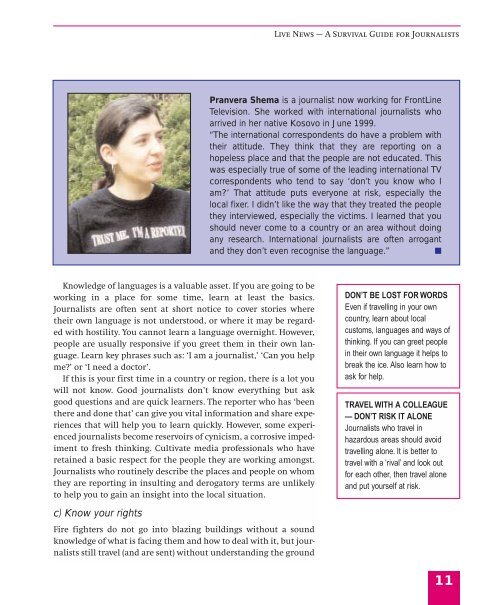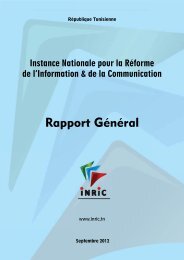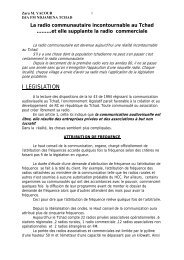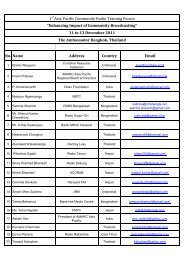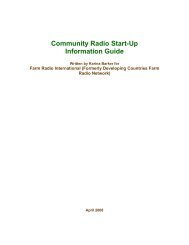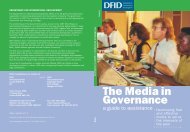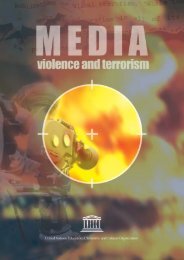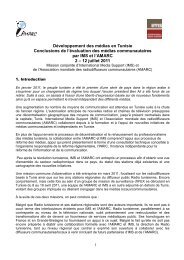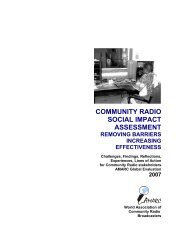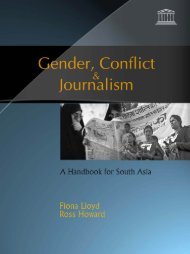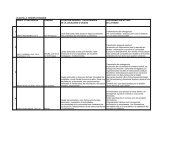Live News - A Survival Guide - International Federation of Journalists
Live News - A Survival Guide - International Federation of Journalists
Live News - A Survival Guide - International Federation of Journalists
- No tags were found...
You also want an ePaper? Increase the reach of your titles
YUMPU automatically turns print PDFs into web optimized ePapers that Google loves.
<strong>Live</strong> <strong>News</strong> — A <strong>Survival</strong> <strong>Guide</strong> for <strong>Journalists</strong>Pranvera Shema is a journalist now working for FrontLineTelevision. She worked with international journalists whoarrived in her native Kosovo in June 1999.“The international correspondents do have a problem withtheir attitude. They think that they are reporting on ahopeless place and that the people are not educated. Thiswas especially true <strong>of</strong> some <strong>of</strong> the leading international TVcorrespondents who tend to say ‘don’t you know who Iam?’ That attitude puts everyone at risk, especially thelocal fixer. I didn’t like the way that they treated the peoplethey interviewed, especially the victims. I learned that youshould never come to a country or an area without doingany research. <strong>International</strong> journalists are <strong>of</strong>ten arrogantand they don’t even recognise the language.”■Knowledge <strong>of</strong> languages is a valuable asset. If you are going to beworking in a place for some time, learn at least the basics.<strong>Journalists</strong> are <strong>of</strong>ten sent at short notice to cover stories wheretheir own language is not understood, or where it may be regardedwith hostility. You cannot learn a language overnight. However,people are usually responsive if you greet them in their own language.Learn key phrases such as: ‘I am a journalist,’ ‘Can you helpme?’ or ‘I need a doctor’.If this is your first time in a country or region, there is a lot youwill not know. Good journalists don’t know everything but askgood questions and are quick learners. The reporter who has ‘beenthere and done that’ can give you vital information and share experiencesthat will help you to learn quickly. However, some experiencedjournalists become reservoirs <strong>of</strong> cynicism, a corrosive impedimentto fresh thinking. Cultivate media pr<strong>of</strong>essionals who haveretained a basic respect for the people they are working amongst.<strong>Journalists</strong> who routinely describe the places and people on whomthey are reporting in insulting and derogatory terms are unlikelyto help you to gain an insight into the local situation.DON’T BE LOST FOR WORDSEven if travelling in your owncountry, learn about localcustoms, languages and ways <strong>of</strong>thinking. If you can greet peoplein their own language it helps tobreak the ice. Also learn how toask for help.TRAVEL WITH A COLLEAGUE— DON’T RISK IT ALONE<strong>Journalists</strong> who travel inhazardous areas should avoidtravelling alone. It is better totravel with a ‘rival’ and look outfor each other, then travel aloneand put yourself at risk.c) Know your rightsFire fighters do not go into blazing buildings without a soundknowledge <strong>of</strong> what is facing them and how to deal with it, but journalistsstill travel (and are sent) without understanding the ground11


